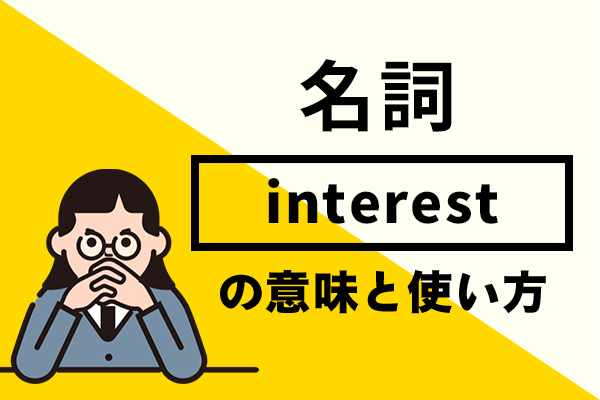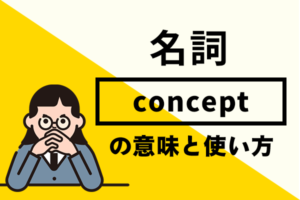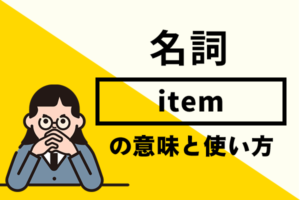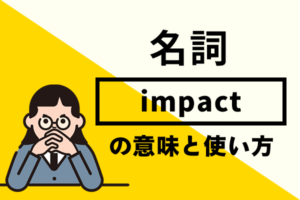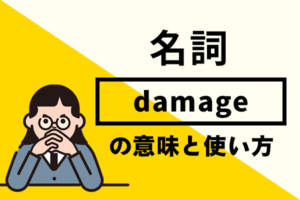「interest」は英語学習者なら誰もが知っている基本単語ですが、実は名詞と動詞で意味が異なり、さらに金融用語としても頻出するなど、非常に幅広い用途を持つ単語です。
特に「be interested in」と「interesting」の使い分けは、多くの学習者が混乱するポイントです。
この記事では、interestのコアイメージから始まり、名詞・動詞それぞれの使い方、よく使われる表現、類義語との違い、そして実際の試験やビジネスシーンでの活用法まで、徹底的に解説します。
TOEICや英検でも頻出のため、正確な理解が得点アップに直結します。
interestのコアイメージ
interestの語源はラテン語の「interesse(その間にある、関わる)」で、inter-(間に)+ esse(存在する)から成り立っています。
コアイメージは「何かと自分の間に関わりがあり、心が引き寄せられる状態」です。
このコアイメージから、「興味・関心」という心理的な意味と、「利害関係・利益」という実務的な意味の両方が派生しています。
また、金融における「利息」も、お金を貸すことで生じる「利益」という関係性から生まれた意味です。
interestの基本情報
| 項目 | 内容 |
|---|---|
| 単語 | interest |
| 発音(名詞・動詞共通) | /ˈɪntrəst/(インタレスト)、/ˈɪntərest/(インタレスト) |
| 品詞 | 名詞・動詞 |
| 語源 | ラテン語 interesse(その間にある、関わる) |
| TOEIC頻出度 | ★★★★★(超頻出) |
| 品詞 | 主な意味 | 使用頻度 |
|---|---|---|
| 名詞 | 興味、関心、利益、利息 | 非常に高い |
| 動詞 | 〜に興味を持たせる、関心を引く | 高い |
| 形容詞(interested) | 興味を持っている | 非常に高い |
| 形容詞(interesting) | 興味深い、面白い | 非常に高い |
※interestは名詞・動詞として使われるほか、過去分詞形の「interested」と現在分詞形の「interesting」が形容詞として非常によく使われます。
発音・アクセントの注意
interestの発音で注意すべき点は以下の通りです。
発音記号:/ˈɪntrəst/ または /ˈɪntərest/
カタカナ表記:インタレスト、インタレスト
【重要ポイント】
1. 第一音節にアクセント
「IN-ter-est」と、最初の「イン」を強く発音します。
2. 中間の音節の弱化
真ん中の「ter」や「te」の部分は弱く、曖昧母音/ə/になります。
そのため「インタレスト」ではなく「インタァスト」「インタレスト」のように聞こえることが多いです。
3. 語尾の「t」をしっかり発音
最後の「t」の音を明確に発音することで、ネイティブらしい発音になります。
4. 派生語の発音
・interested /ˈɪntrəstɪd/(インタレスティド)
・interesting /ˈɪntrəstɪŋ/(インタレスティング)
どちらも第一音節にアクセントがあります。
よくある発音ミス:
❌「インテレスト」と「テ」を強く発音する
✅「インタレスト」と第一音節を強調
interestの意味とニュアンス
【名詞】興味、関心
最も基本的かつ頻繁に使われる意味で、何かに対して心が引かれる状態を表します。
「have an interest in」「show interest in」「take an interest in」などの形でよく使われます。
She has a great interest in classical music.
彼女はクラシック音楽に強い関心を持っている。
The company showed interest in our proposal.
その会社は私たちの提案に興味を示した。
His main interest is photography.
彼の主な興味は写真撮影だ。
【名詞】利益、利害関係
ビジネスや法律の文脈で使われる意味で、何かに対する実質的な利害や権利を表します。
「in someone’s interest」(〜の利益になる)、「conflict of interest」(利益相反)などの形で頻出します。
It’s in your best interest to accept the offer.
その申し出を受け入れることがあなたの最善の利益になる。
The judge had a conflict of interest in the case.
その裁判官はその事件に利益相反があった。
We must protect the interests of our shareholders.
私たちは株主の利益を守らなければならない。
【名詞】利息、金利
金融用語として、借りたお金や預けたお金に対して支払われる、または受け取る金額を指します。
「interest rate」(金利)、「compound interest」(複利)など、経済ニュースやビジネス文書で頻出します。
The bank pays 2% interest on savings accounts.
その銀行は普通預金口座に2%の利息を支払う。
We need to pay the interest on our loan every month.
私たちは毎月ローンの利息を支払う必要がある。
The interest rate has increased by 0.5%.
金利が0.5%上昇した。
【動詞】〜に興味を持たせる、関心を引く
何かが人の注意や関心を引くことを表します。
通常は「interest + 人 + in + 物事」の形で使われ、受動態「be interested in」の形が非常によく使われます。
This book will interest anyone who loves history.
この本は歴史好きな人なら誰でも興味を持つだろう。
The news report interested viewers across the country.
そのニュース報道は全国の視聴者の関心を引いた。
Can I interest you in our new product?
当社の新製品に興味をお持ちいただけますか。
interestの使い方
be interested in(〜に興味がある)
最も頻繁に使われる表現で、主語(人)が何かに興味を持っている状態を表します。
「in」の後には名詞または動名詞(〜ing)が続きます。
I’m interested in learning Japanese.
私は日本語を学ぶことに興味がある。
Are you interested in joining our team?
私たちのチームに参加することに興味はありますか。
She’s not interested in politics.
彼女は政治に興味がない。
Many students are interested in studying abroad.
多くの学生が留学に興味を持っている。
He seems interested in the project.
彼はそのプロジェクトに興味があるようだ。
interesting(興味深い、面白い)
何かが人に興味を持たせる性質を持っていることを表します。
主語は通常「物事」で、人を興味深くさせる側です。
This is a very interesting book.
これはとても興味深い本だ。
That’s an interesting idea.
それは面白いアイデアだ。
She told us an interesting story.
彼女は私たちに興味深い話をしてくれた。
The meeting was more interesting than I expected.
その会議は予想以上に興味深かった。
It’s interesting to see how technology has changed our lives.
テクノロジーがどのように私たちの生活を変えたかを見るのは興味深い。
have/take/show an interest in(〜に興味を持つ/示す)
興味を持つという行為や状態を名詞として表現する形です。
フォーマルな文脈でよく使われ、ビジネス英語でも頻出します。
He has always had an interest in astronomy.
彼は常に天文学に興味を持っていた。
Several companies have shown interest in acquiring our business.
いくつかの企業が当社の事業買収に興味を示している。
You should take more interest in your studies.
あなたはもっと勉強に興味を持つべきだ。
The museum attracts people with an interest in modern art.
その美術館は現代美術に興味のある人々を引きつける。
She expressed interest in the position during the interview.
彼女は面接中にそのポジションに興味を示した。
interestの慣用表現
interest oneself in(〜に興味を持つ、〜に関心を向ける)
やや古風で文語的な表現で、自分自身を何かに向けるという意味です。
He interested himself in local politics after retirement.
彼は退職後、地方政治に関心を向けた。
She has interested herself in environmental issues.
彼女は環境問題に興味を持つようになった。
interestのコロケーション
| コロケーション | 意味 | 例文 |
|---|---|---|
| keen interest | 強い関心 | He has a keen interest in technology. |
| growing interest | 高まる関心 | There’s growing interest in renewable energy. |
| common interest | 共通の興味 | We share a common interest in music. |
| public interest | 公共の利益 | The decision was made in the public interest. |
| personal interest | 個人的な興味 | She pursues photography as a personal interest. |
| vested interest | 既得権益 | They have a vested interest in the outcome. |
| interest rate | 金利 | The central bank raised interest rates. |
| compound interest | 複利 | Compound interest helps savings grow faster. |
| conflict of interest | 利益相反 | The lawyer had a conflict of interest. |
| lose interest | 興味を失う | Children quickly lose interest in new toys. |
| arouse interest | 興味を引き起こす | The discovery aroused great interest. |
| spark interest | 興味を喚起する | The article sparked interest in the topic. |
interestを使った例文(シーン別)
試験でよく出る例文
I’m interested in applying for the position advertised in the newspaper.
新聞に掲載されている職に応募することに興味があります。
The lecture was so interesting that everyone stayed until the end.
その講義はとても興味深かったので、全員が最後まで残った。
Many investors have shown interest in the new technology.
多くの投資家がその新技術に興味を示した。
The bank offers competitive interest rates on mortgages.
その銀行は住宅ローンで競争力のある金利を提供している。
It would be in your interest to read the contract carefully.
契約書を注意深く読むことがあなたの利益になるでしょう。
She has a wide range of interests, from sports to classical music.
彼女はスポーツからクラシック音楽まで幅広い興味を持っている。
日常会話で使う例文
What are your interests?
あなたの興味は何ですか。
That sounds interesting! Tell me more.
それは面白そうだね!もっと教えて。
I’m not really interested in watching that movie.
その映画を観ることにはあまり興味がないんだ。
Would you be interested in joining us for dinner?
私たちと一緒に夕食を取ることに興味はありますか。
My son has recently developed an interest in cooking.
息子は最近料理に興味を持ち始めた。
I find it interesting how languages change over time.
言語が時間とともにどう変化するかは興味深いと思う。
She’s interested in everything related to fashion.
彼女はファッションに関するすべてのことに興味がある。
ビジネス文書・メールで使う例文
Thank you for your interest in our company.
当社に興味をお持ちいただきありがとうございます。
We are interested in exploring potential partnership opportunities.
私たちは潜在的なパートナーシップの機会を模索することに興味があります。
Please find attached the information that might interest you.
ご興味をお持ちいただけるかもしれない情報を添付いたします。
The proposal has generated considerable interest among stakeholders.
その提案は利害関係者の間でかなりの関心を集めています。
We must act in the best interests of our clients.
私たちは顧客の最善の利益のために行動しなければなりません。
Interest will be charged at a rate of 5% per annum.
利息は年率5%で課されます。
We have received expressions of interest from several potential buyers.
数名の潜在的な買い手から関心表明を受け取りました。
Could you please confirm your interest in attending the conference?
会議への出席のご意向を確認していただけますか。
interestの類義語・関連語
| 単語 | 品詞 | ニュアンス・解説 |
|---|---|---|
| curiosity | 名詞 | 好奇心(より強い探究心を含む) |
| fascination | 名詞 | 魅力、強い興味(より強い引きつけられる感覚) |
| concern | 名詞 | 関心、懸念(心配の意味も含む) |
| attention | 名詞 | 注意、関心(より一時的な注目) |
| passion | 名詞 | 情熱(より強い感情的な興味) |
| hobby | 名詞 | 趣味(具体的な活動を指す) |
| profit | 名詞 | 利益(金銭的な利益に特化) |
| benefit | 名詞 | 利益、恩恵(より広い意味での利点) |
| engage | 動詞 | 引き込む、関与させる(より積極的な関与) |
| fascinate | 動詞 | 魅了する(より強い魅力で引きつける) |
| attract | 動詞 | 引きつける(物理的・心理的な引力) |
| captivate | 動詞 | 魅了する(完全に注意を捉える) |
「interest」と似た意味を持つcuriosityの意味と使い方や、より強い魅力を表すfascinationの意味と使い方も合わせてチェックすると理解が深まります。
混同されやすい語との違い
interest vs curiosity
interest(興味、関心)は、何かに対して持続的に関心を持っている状態を表します。
より一般的で広い概念で、長期的な関心を含みます。
curiosity(好奇心)は、知りたい、理解したいという欲求を表します。
より能動的で探究的なニュアンスがあり、未知のものに対する欲求を強調します。
She has an interest in ancient civilizations.
彼女は古代文明に興味がある。
(一般的な関心)
His curiosity about ancient civilizations led him to become an archaeologist.
古代文明への好奇心が彼を考古学者にした。
(探究心を強調)
The article aroused my interest in the topic.
その記事はそのトピックへの私の興味を引き起こした。
The article aroused my curiosity about the topic.
その記事はそのトピックへの私の好奇心を引き起こした。
(より強く知りたいという欲求)
interested vs interesting
これは多くの英語学習者が混乱する重要なポイントです。
interested(興味を持っている)は、人が主語になり、その人が興味を持っている状態を表します。
過去分詞形で、「興味を持たされた状態」という受動的なニュアンスです。
interesting(興味深い、面白い)は、物事が主語になり、それが人に興味を持たせる性質があることを表します。
現在分詞形で、「興味を持たせる性質を持つ」という能動的なニュアンスです。
❌ I am interesting in science.
✅ I am interested in science.
私は科学に興味がある。
解説:人が主語なので「interested」を使います。
❌ The book is interested.
✅ The book is interesting.
その本は面白い。
解説:物が主語なので「interesting」を使います。
She seems interested in the proposal.
彼女はその提案に興味があるようだ。
(彼女が興味を持っている)
The proposal seems interesting.
その提案は興味深いようだ。
(提案が興味深い性質を持つ)
覚え方のコツ:
・人 + interested(人が興味を持つ側)
・物事 + interesting(物事が興味を引く側)
interest vs benefit
interest(利益、利害関係)は、何かに対する関与や権利、特に長期的または継続的な利害関係を表します。
より抽象的で、権利や立場に関わる概念です。
benefit(利益、恩恵)は、具体的な利点や良い結果を表します。
より具体的で、直接的な利点を強調します。
We must protect the interests of all stakeholders.
私たちはすべての利害関係者の利益を守らなければならない。
(継続的な利害関係)
The new policy will bring benefits to employees.
新しい方針は従業員に利益をもたらすだろう。
(具体的な恩恵)
It’s in your best interest to accept the offer.
その申し出を受け入れることがあなたの最善の利益になる。
(長期的な利害)
The benefit of this approach is immediate cost savings.
このアプローチの利点は即座のコスト削減だ。
(具体的な利点)
試験・ビジネス頻出度
TOEIC
★★★★★(超頻出)
interestはTOEICで最も頻繁に出題される単語の一つです。特にPart 5(短文穴埋め)とPart 7(読解)で頻出します。
【頻出パターン】
・be interested in 〜(〜に興味がある)
・show interest in 〜(〜に興味を示す)
・interest rate(金利)
・in the interest of 〜(〜の利益のために)
・conflict of interest(利益相反)
英検
★★★★★
準2級から1級まで、すべてのレベルで出題されます。特に準1級以上では、ビジネス文脈での「利益」や「利害関係」の意味も重要です。
ビジネス英語
★★★★★(必須)
ビジネスシーンで最も頻繁に使われる単語の一つです。
【ビジネスでの主な用途】
・顧客や取引先の関心を確認する
・製品やサービスへの興味を引く
・利害関係者の利益を議論する
・金融商品の利息を説明する
・利益相反を避ける
大学入試
★★★★★
基本単語として必須です。特に「interested」と「interesting」の使い分けは頻出問題です。
ネイティブがよく使う自然な表現
Just out of interest…(ちょっと興味本位で聞くんだけど…)
カジュアルな質問をする際の前置きとして使われます。
Just out of interest, how much did you pay for that car?
ちょっと興味本位で聞くんだけど、その車いくらで買ったの?
Interesting…(へえ、面白いね)
相手の話に対する反応として非常によく使われます。時に皮肉や疑問のニュアンスを含むこともあります。
A: I’ve decided to quit my job and travel the world.
A: 仕事を辞めて世界旅行することにしたんだ。
B: Interesting… Have you thought this through?
B: へえ…よく考えた?
That’s interesting to know(それは知っておくと面白いね)
新しい情報を得た時の反応として使われます。
So the meeting has been moved to Friday. That’s interesting to know.
会議が金曜日に変更されたんだね。それは知っておくと良いね。
of interest(興味深い、重要な)
フォーマルな文脈で「注目に値する」という意味で使われます。
There are several points of interest in the report.
その報告書には注目すべき点がいくつかある。
place of interest(名所、観光地)
観光や旅行の文脈でよく使われます。
The city has many places of interest for tourists.
その都市には観光客向けの名所がたくさんある。
lose interest(興味を失う)
何かへの関心が薄れることを表す自然な表現です。
Children often lose interest quickly in new toys.
子どもたちは新しいおもちゃにすぐに興味を失うことが多い。
hold someone’s interest(人の興味を保つ)
継続的に関心を引き続けることを表します。
The movie managed to hold my interest throughout.
その映画は最後まで私の興味を保つことができた。
Can I interest you in…?(〜はいかがですか)
販売やサービス提供の場面で丁寧に勧める表現です。
Can I interest you in a cup of coffee?
コーヒーはいかがですか。
It may be of interest to note that…(〜ということは注目に値するかもしれません)
フォーマルなプレゼンテーションや文書で追加情報を紹介する際に使います。
It may be of interest to note that sales have increased by 30%.
売上が30%増加したことは注目に値するかもしれません。
interestのよくある間違い
❌ I am interesting in learning French.
✅ I am interested in learning French.
解説:人が主語の場合は「interested」を使います。「interesting」は物事が主語の時に使います。これは最も多い間違いです。
❌ The movie was very interested.
✅ The movie was very interesting.
解説:映画(物)が主語なので「interesting」を使います。映画が興味を持つのではなく、興味を引き起こす性質を持つという意味です。
❌ He has interest on music.
✅ He has an interest in music.
解説:「interest in」が正しい前置詞の組み合わせです。また、可算名詞として使う場合は冠詞「an」が必要です。
❌ I interest in sports.
✅ I am interested in sports.
解説:動詞としての「interest」は「〜に興味を持たせる」という意味なので、受動態「be interested in」を使います。
❌ This book interests to me.
✅ This book interests me.
解説:動詞「interest」は他動詞なので、直接目的語を取ります。前置詞「to」は不要です。
❌ I have many interest.
✅ I have many interests.
解説:「趣味・興味」の意味で使う場合、可算名詞なので複数形「interests」にする必要があります。
❌ She showed interest for the position.
✅ She showed interest in the position.
解説:「interest」と一緒に使う前置詞は「in」です。「for」は使いません。
❌ The bank pays 3% interest of savings.
✅ The bank pays 3% interest on savings.
解説:金利・利息の文脈では「interest on」が正しい表現です。
❌ It’s interesting for me to hear that.
✅ It’s interesting to hear that.
または I’m interested to hear that.
解説:「It’s interesting」構文では通常「for me」は不要です。主観を強調したい場合は「I’m interested」を使います。
❌ He has no any interest in politics.
✅ He has no interest in politics.
または He doesn’t have any interest in politics.
解説:「no」と「any」を同時に使うことはできません。どちらか一方を使います。
interestの理解度チェック
穴埋め問題(5問)
1. I’m very ______ in learning more about your company.
(私は御社についてもっと知ることに非常に興味があります)
2. The presentation was so ______ that nobody fell asleep.
(そのプレゼンテーションはとても興味深かったので、誰も眠らなかった)
3. Many people have shown ______ in the new product.
(多くの人々がその新製品に興味を示した)
4. The bank offers a competitive ______ rate on mortgages.
(その銀行は住宅ローンで競争力のある金利を提供している)
5. It’s in your best ______ to read the contract carefully.
(契約書を注意深く読むことがあなたの最善の利益になります)
選択肢問題(5問)
1. She has always ______ a keen interest in environmental issues.
a) had
b) made
c) done
d) taken
2. The documentary was extremely ______ and educational.
a) interest
b) interested
c) interesting
d) interests
3. Are you ______ in joining our team for the project?
a) interest
b) interesting
c) interested
d) interests
4. The company must act in the ______ of its shareholders.
a) interest
b) interests
c) interested
d) interesting
5. Can I ______ you in a cup of tea?
a) interest
b) interested
c) interesting
d) interests
解答
穴埋め問題の解答
1. interested
「be interested in」で「〜に興味がある」という意味です。
2. interesting
プレゼンテーション(物)が主語なので「interesting」を使います。
3. interest
「show interest in」で「〜に興味を示す」という表現です。
4. interest
「interest rate」で「金利」という意味の複合名詞です。
5. interest/interests
「in someone’s (best) interest(s)」で「〜の利益になる」という意味です。単数・複数どちらも可能です。
選択肢問題の解答
1. a) had
「have an interest in」で「〜に興味がある」という表現です。
2. c) interesting
ドキュメンタリー(物)が主語なので「interesting」を使います。
3. c) interested
「Are you interested in…?」で「〜に興味がありますか」という表現です。
4. b) interests
「in the interests of」で「〜の利益のために」という意味です。複数形が一般的です。
5. a) interest
「Can I interest you in…?」で「〜はいかがですか」という丁寧な勧誘表現です。動詞の原形を使います。
interestのコーパス実例
新聞記事:The New York Times
“The Federal Reserve raised interest rates by 0.25 percentage points, citing continued economic growth and low unemployment.”
連邦準備制度理事会は、継続的な経済成長と低失業率を理由に、金利を0.25ポイント引き上げた。
金融ニュースでの典型的な使用例です。「interest rates」(金利)は経済記事で最頻出の表現の一つです。
“There is growing interest among consumers in sustainable and eco-friendly products.”
持続可能で環境に優しい製品に対する消費者の関心が高まっている。
市場動向を伝える記事での使用例です。「growing interest」(高まる関心)は頻出のコロケーションです。
“The discovery has generated significant interest in the scientific community.”
その発見は科学界で大きな関心を呼んでいる。
学術的な話題での使用例です。「generate interest」(関心を生み出す)はフォーマルな表現です。
日常会話:映画のセリフ
“I’m interested in hearing what you have to say.”
あなたの言いたいことを聞くことに興味があります。
(映画「The Social Network」より)
ビジネス交渉の場面で、相手の意見を聞く姿勢を示す表現です。丁寧で真剣なトーンを伝えます。
“That’s interesting. Tell me more.”
それは面白いね。もっと教えて。
(様々な映画で頻出)
会話で相手の話に興味を示す最も一般的な反応の一つです。
“Interesting choice of words.”
興味深い言葉の選び方だね。
(映画「The Devil Wears Prada」より)
皮肉や疑問を含んだ使い方の例です。必ずしも肯定的な意味だけではありません。
ビジネススピーチ:TED Talk
“What’s interesting is that we found a pattern that nobody had noticed before.”
興味深いことに、私たちは以前誰も気づかなかったパターンを発見しました。
(様々なTED Talkで頻出の表現)
プレゼンテーションで新しい発見や重要なポイントを導入する際の典型的な表現です。
“If you’re interested in making a real difference, here’s what you can do.”
もし本当に変化を起こすことに興味があるなら、これがあなたにできることです。
聴衆に行動を促す際の効果的な表現です。
“The question that interests me most is: Why do we do what we do?”
私が最も興味を持っている質問は、「なぜ私たちは自分たちがすることをするのか」です。
(Simon SinekのTED Talkより)
探究心や問題意識を表現する際の使用例です。動詞としての「interest」の使い方を示しています。
interestに関するよくある質問
interestingは「興味深い、面白い」という意味で、物事が主語になります。例:The book is interesting.(その本は面白い)
簡単に覚えるコツは、「人はinterested、物はinteresting」です。人が興味を「持つ」側、物が興味を「引く」側と考えると分かりやすいでしょう。
interest in:興味・関心の対象を表す時に使います。例:She has an interest in art.(彼女は美術に興味がある)これが最も一般的な使い方です。
interest on:金利・利息の文脈で使います。例:The bank pays 2% interest on savings.(その銀行は預金に2%の利息を払う)
興味・関心の意味では必ず「in」を使い、金融用語としては「on」を使うと覚えましょう。
「I’m interesting」と言うと、「私は(他人にとって)面白い人間だ」という意味になってしまいます。自分がスポーツに興味があることを表現したい場合は、必ず「I’m interested in sports」と言います。
この間違いは非常に多いので、「人が興味を持つ = interested」と覚えておきましょう。
使用例:
・Thank you for your interest in our company.(当社に興味をお持ちいただきありがとうございます)
・Thank you for your interest in the position.(その職に関心をお寄せいただきありがとうございます)
問い合わせや応募に対する返信の際に、相手の行動に感謝を示す標準的なフレーズです。
lose interest:何かへの興味を失うという一般的な意味。例:He lost interest in the project.(彼はそのプロジェクトへの興味を失った)
interests(複数形):複数の趣味や関心事を指す時に使います。例:She has many interests, including music and sports.(彼女は音楽やスポーツなど多くの興味を持っている)
「興味を失う」という表現では、通常単数形の「lose interest」を使います。
アクセントのポイント:
・「interest」の第一音節「IN」にアクセント
・「rate」も同様に強く発音
・両方の単語の最初にアクセントがあるため、「IN-terest RATE」のようなリズムになります
金融や経済のニュースで非常に頻繁に使われる表現なので、正しい発音を身につけることが重要です。
be interested in doing:一般的な興味や趣味を表します。継続的または潜在的な興味を示します。
例:I’m interested in learning French.(私はフランス語を学ぶことに興味がある)
be interested to do:特定の行為をすることに興味があるという、よりその場での意欲を表します。
例:I’d be interested to hear your opinion.(あなたの意見を聞きたいです)
日常会話やビジネスでは「be interested in doing」の方がより一般的です。
まとめ
- interestのコアイメージは「何かと自分の間に関わりがあり、心が引き寄せられる状態」
- 主な意味は「興味・関心」(名詞・動詞)、「利益・利害関係」(名詞)、「利息」(名詞)の3つ
- 「interested」は人が主語、「interesting」は物事が主語という使い分けが最重要
- 「be interested in」は最頻出表現で、前置詞は必ず「in」を使う
- ビジネス英語では「利益」「金利」の意味も非常に重要
- TOEIC、英検、ビジネスシーンで超頻出の必須単語
- 「interest rate」「conflict of interest」「in someone’s interest」などの熟語表現を覚える
この記事の例文や練習問題を繰り返し復習すると、interestの使い方が自然に身につきます。特に「interested」と「interesting」の違いは、実際の会話やライティングで何度も使って体に染み込ませることが重要です。
英単語を効率よく覚えられるおすすめ本
英語学習の基本は、まず語彙力をしっかり身につけること。
ここでは、効率よく英単語を覚えて、長く使える力に変えていけるおすすめの本をご紹介します。

